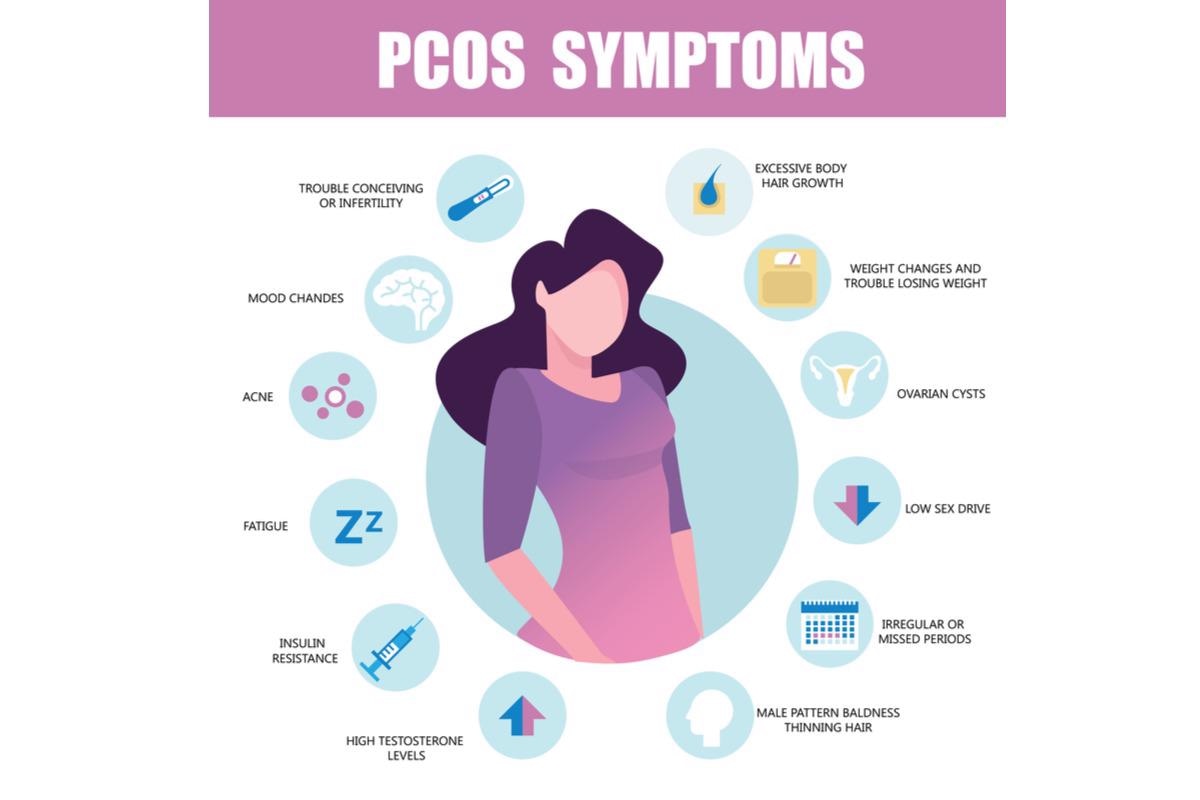Polycystic ovary syndrome (PCOS) is a type of endocrine disorder characterized by an abnormal menstrual cycle and the presence of multiple small cysts on the ovaries. The condition is developed due to excessive production of male sex hormones (androgens) by the ovaries.

Image Credit: pathdoc/Shutterstock
Despite not having ovaries, men can develop clinical characteristics similar to PCOS as a result of certain genetic risk factors. The condition is defined as male equivalent PCOS.
What is polycystic ovary syndrome?
Polycystic ovary syndrome (PCOS) develops when the endocrine system of a woman fails to produce enough hormones necessary for ovulation (release of mature eggs from the ovary). This leads to the development of multiple small cysts on the ovaries. The production of excessive amounts of male sex hormones or androgens by these cysts further causes infrequent or prolonged menstruation.
Obesity and insulin resistance are two major risk factors for PCOS. In both cases, insulin accumulates in the body, leading to higher production of androgens. Some recent evidence has identified a genetic component associated with the development of PCOS.
What is male PCOS?
Male relatives of women with PCOS may develop similar clinical characteristics (male PCOS) because of the inheritance of certain susceptible genes responsible for the PCOS pathogenesis. Besides hormonal and metabolic abnormalities, male PCOS is characterized by early-onset androgenetic alopecia (baldness), hypertrichosis (excessive hair growth anywhere on the body), or acne.
Men with PCOS-like symptoms are at higher risk of developing cardiovascular and metabolic disorders. In this context, studies have shown that the first-degree relatives of women with PCOS are genetically more likely to have insulin resistance, obesity, cardiovascular disease, type 2 diabetes mellitus, and early-onset androgenetic alopecia. The presence of PCOS-like characteristics can predispose men to develop prostate cancer, benign prostate hyperplasia, and prostatitis later in life.

Image Credit: Torrenta Y/Shutterstock
Hormonal characteristics of male PCOS
Men with early-onset androgenetic alopecia exhibit similar hormonal changes associated with PCOS. Moreover, there is an association between male PCOS and the hormonal landscape of insulin resistance and metabolic syndrome. Given its high prevalence among male family members of women with PCOS, early-onset androgenetic alopecia is considered to be a prominent sign of male PCOS.
The shared hormonal landscape between early-onset androgenetic alopecia and PCOS includes reduced levels of follicle-stimulating hormone, sex hormone-binding globulin, testosterone, and epitestosterone, and increased levels of luteinizing hormone, prolactin, and dehydroepiandrosterone sulfate.
Like women with PCOS, men with early-onset androgenetic alopecia have increased activity of the adrenal gland. Regarding fertility potency, there is evidence suggesting that men with moderate to severe early-onset androgenetic alopecia have poor semen quality. However, it is not known whether men with PCOS-like symptoms exhibit the same feature.
Metabolic characteristics of male PCOS
Early-onset androgenetic alopecia is associated with a number of metabolic changes, including reduced insulin sensitivity and sex hormone-binding globulin levels. A reduced sex hormone-binding globulin level is considered to be a risk factor for hyperglycemia, insulin resistance, diabetes, hypertriglyceridemia, and hypertension in men with early-onset androgenetic alopecia. A higher prevalence of these metabolic changes together with early-onset androgenetic alopecia has been observed in brothers of women with PCOS.
Take-home message
Early-onset androgenetic alopecia is the phenotypic hallmark of male PCOS. The high prevalence of early-onset androgenetic alopecia in men belonging to households with PCOS-affected women supports the notion of genetic transmission of the condition.
Although a high body mass index (BMI) and obesity do not typically define male PCOS, the presence of these factors can significantly augment the development of hormonal, metabolic, and clinical abnormalities associated with the condition. Thus, body weight reduction approaches may have beneficial effects on male PCOS in terms of reducing blood androgen levels and insulin resistance, as well as subsiding the risk of developing cardiovascular disorders and type 2 diabetes mellitus.
In women with PCOS, a healthy diet and regular physical exercise can help reduce body weight and lessen symptom intensity. These lifestyle changes also help increase insulin sensitivity in PCOS-affected women. For a timely adoption of a healthy lifestyle, an early diagnosis of the condition is necessary. This could potentially prevent the development and progression of hormonal, metabolic, and cardiovascular events.
References:
Further Reading
Last Updated: Feb 24, 2022